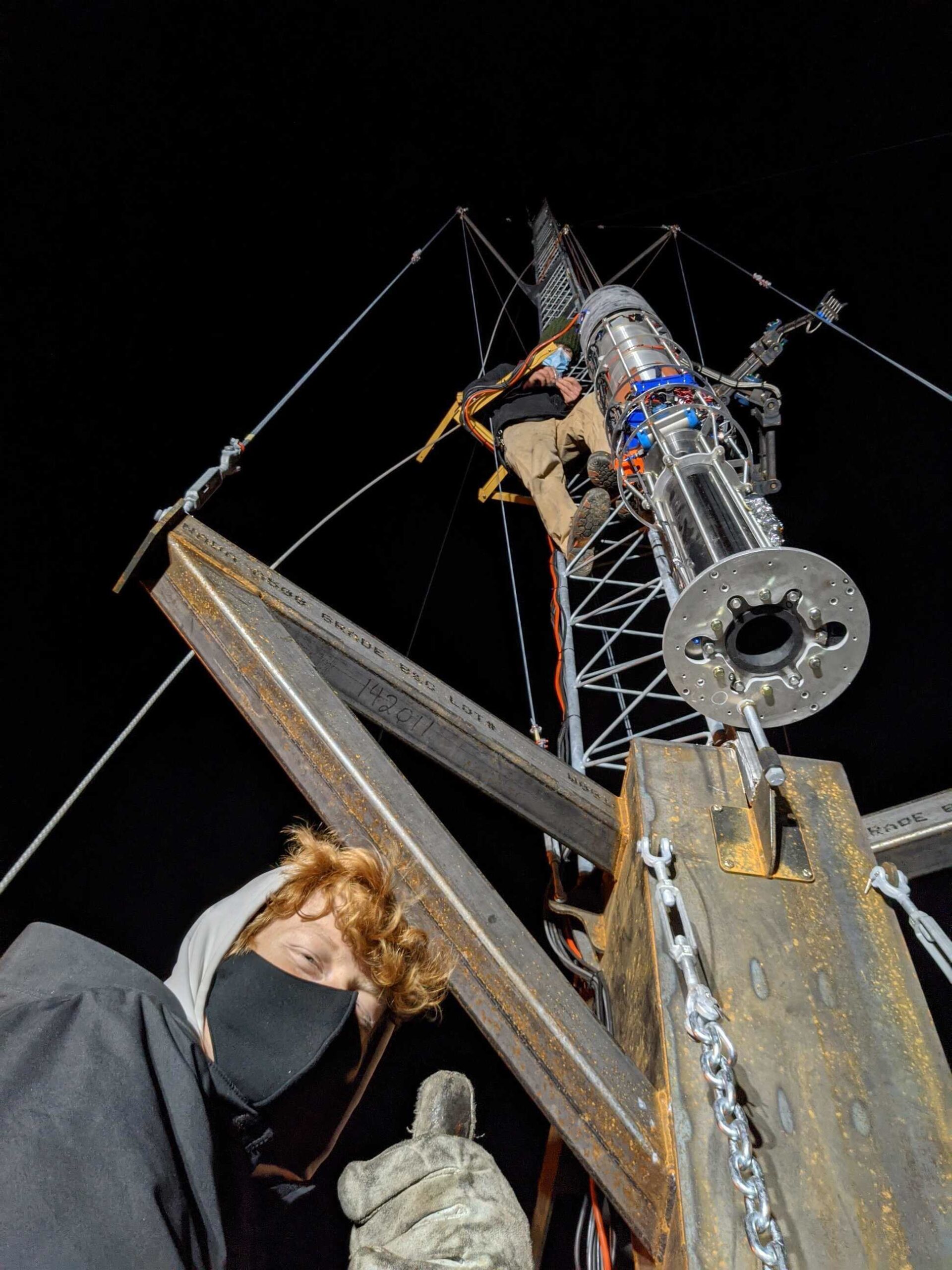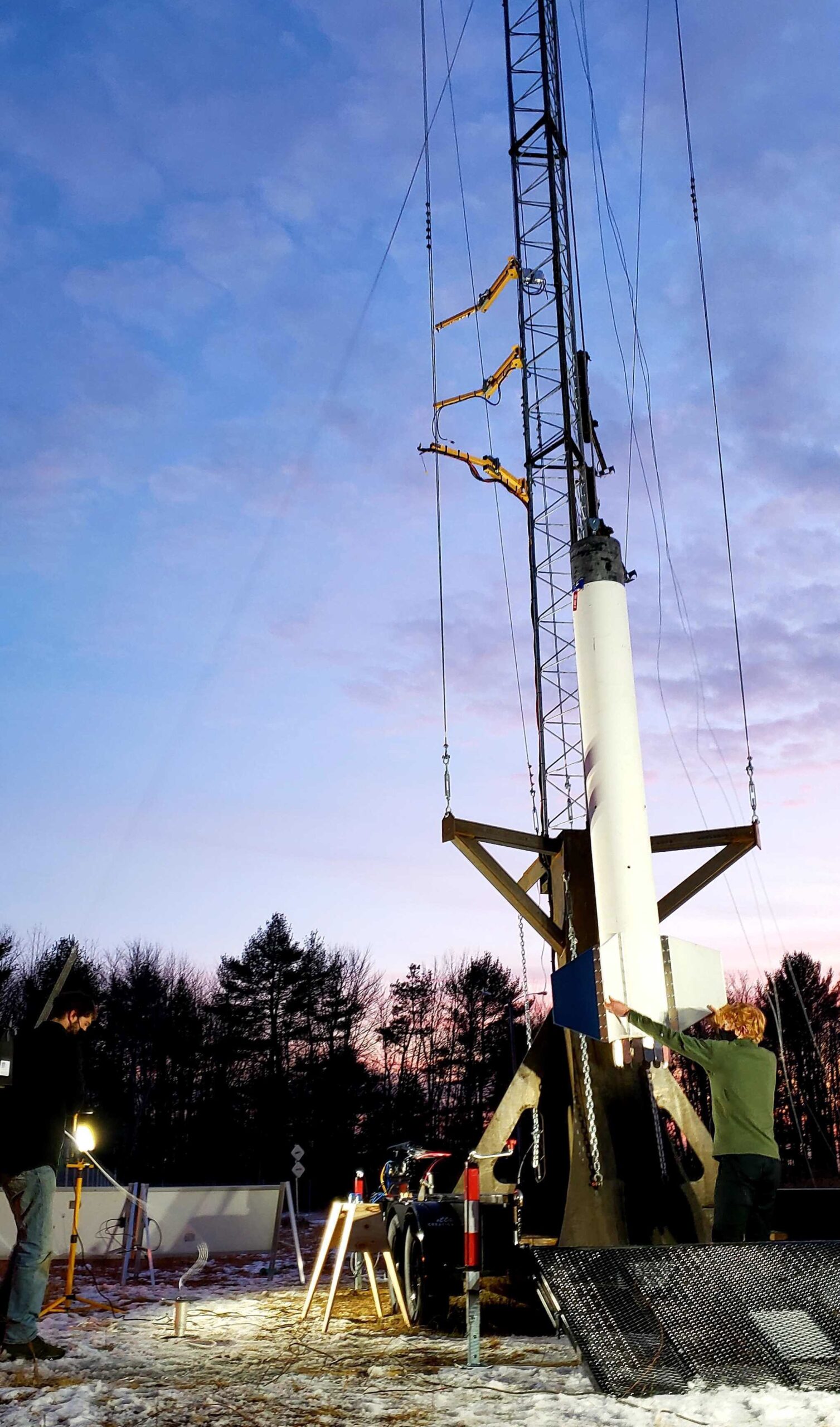Giltner ’23 worked to bring historic rocket launch
February 12, 2021
For James Giltner ’23, what started out as a search for how to fill his semester away from Bowdoin turned into a groundbreaking learning experience—one that culminated in a historic rocket launch.
Last fall, Giltner worked full-time at bluShift, a Brunswick-based company that launched a rocket from the Loring Commerce Center in Limestone, Maine, on January 31. The rocket, named Stardust 1, achieved a number of milestones as the first commercial rocket to be launched in Maine and the first ever commercial rocket powered by a bio-derived fuel.
 Courtesy of James Giltner
Courtesy of James GiltnerLiving in Harpswell this past fall, Giltner described the experience as an enriching learning opportunity. He would drive to bluShift’s site in his boss’s truck, where he worked on a slew of different tasks from eight to six every day. His 40-hour work week consisted of constructing, soldering and wiring various parts of the rocket.
The learning experience was not without setbacks, however, and while recounting his working experience under the team’s engineers, he mentioned that the work demanded perseverance and a set of skills elusive to traditional classrooms.
“I basically worked under the wing of a couple of their head engineers, so they would basically assign [me] projects,” said Giltner. “For the first 10 weeks, it was building these rocket tubes made out of carbon fiber and fiberglass. They ended up failing really horribly seven weeks in, so all that time was basically washed, and we had to go [for] plan B.”
“School teaches you a certain set of tools but [physically] building stuff is a completely different set of skills. I had no idea how terrible I would be at [it],” Giltner added. “Being at Bowdoin, you kind of get used to success in some way, and so I got to this company and it was just such a huge learning curve.”
Facing a workplace drastically different from Bowdoin’s classrooms, Giltner also had to adjust his expectations and learn how to use specific machinery and tools—as well as ditching his usual attire for something more tool-friendly.
“It was funny, in the first few days I would wear the stuff I would wear to school, like I wore a sweater and like jeans or something like that, and they kind of just laughed, like ‘dude you’re gonna get that completely destroyed,’ so I was just out of my element completely,” Giltner said. “But I eventually started to catch on a little bit.”
 Courtesy of James Giltner
Courtesy of James GiltnerSascha Deri, bluShift’s CEO, started the company in 2014 in Massachusetts, where he had been running a solar product distribution company, Alt-E. The company’s move to Maine was motivated by its inability to test bluShift rocket engines in Massachusetts and the availability of grants and investment opportunities in Maine, Deri’s home state.
“We found, importantly, a place right here in Brunswick Landing, which welcomed us with open arms to not only to our engine tests but to ultimately start working on manufacturing our rockets here in Maine,” Deri said in a phone interview with the Orient. “It was like a wonderful complete circle from my childhood back to this point where I could finally come back to Maine with a high tech company.”
Part of the significance of bluShift’s rocket launch lies in its bio-derived fuel. When visiting his brother’s organic farm, Deri discovered an environmentally friendly substitute for petroleum. The substitute was greatly improved upon further refinement and testing. Not only is this fuel more efficient, it’s also cheaper and safer than alternatives.
“Immediately it was clear that it performed not only as good as petroleum, but better than the petroleum alternative,” Deri said. “If the rocket ditches in the ocean you will not kill off fish and wildlife or hurt the ecosystem—I don’t think many rockets can say that; many rockets do end up in the ocean still today.”
Giltner found incredible excitement and inspiration in this episode, and said that the experience motivated him to enter similar engineering positions in the future.
“To have the final product be something [based on the work of] six years,” said Giltner.”It’s super exciting and the reward is huge.”
While Giltner was not there when Stardust 1 launched on January 31, he watched his project’s ascension—and the reactions of his bluShift colleagues—via livestream. The triumphant launch was a moment of incredible excitement.
“Just seeing the response of one of my closer co-workers [was] nuts,” said Giltner. “I’ve never seen anyone happier than that.”
Tianyi Xu contributed to this report.
Comments
Before submitting a comment, please review our comment policy. Some key points from the policy:
- No hate speech, profanity, disrespectful or threatening comments.
- No personal attacks on reporters.
- Comments must be under 200 words.
- You are strongly encouraged to use a real name or identifier ("Class of '92").
- Any comments made with an email address that does not belong to you will get removed.

Wow! That is awesome. What an accomplishment and learning experience for James.
Incredible! What a learning experience.